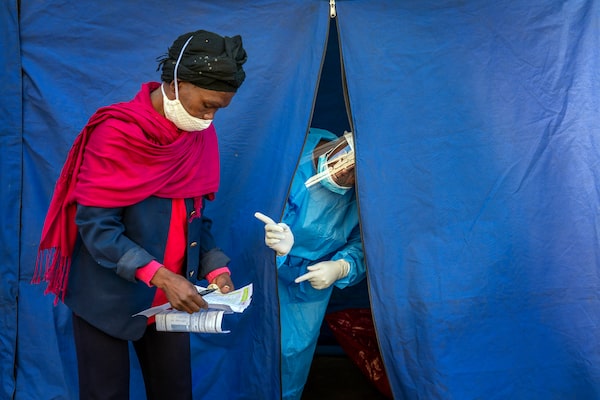
Heath officials check the listings of people who are to be tested for COVID-19 as well as HIV and tuberculosis, in downtown Johannesburg on April 30, 2020.Jerome Delay/The Associated Press
New figures from the front lines of infectious-disease campaigns are confirming the fears of many health experts: The coronavirus pandemic is inflicting heavy damage on the global fight against HIV and tuberculosis.
South Africa, which has among the world’s highest rates of TB and HIV, is reporting sharp declines in public health responses to both diseases. Testing for tuberculosis has been reduced dramatically, and thousands of patients are unable to get the life-saving medicine they need for the two diseases.
“I have worked on tuberculosis for two decades, and I have never been more scared,” said Madhukar Pai, the Canada Research Chair in Epidemiology and Global Health at McGill University in Montreal.
“This pandemic is absolutely devastating for our quest to end the big three killers – AIDS, TB and malaria,” Dr. Pai told The Globe and Mail. “If we were climbing a mountain before COVID-19, that mountain just became Mount Everest.”
Studies have predicted that the collateral damage caused by the pandemic in sub-Saharan Africa could be 500,000 extra deaths from AIDS-related illnesses over the next two years, and a possible doubling of malaria deaths this year. Globally, it could cause an additional 1.4 million TB deaths over a five-year period.
The paradox of prevention: By avoiding the worst, we remain vulnerable to future waves of disease
The psychology of inoculation: how many will take a coronavirus vaccine?
Data from South Africa this month support those concerns.
In the country’s economic heartland, Gauteng province, nearly 11,000 people failed to collect their HIV medicine after a national lockdown was imposed in late March, while more than 1,000 people did not collect their TB medicine in the same period, the provincial health department says. It also reports that travel restrictions have led to interruptions in the supply and distribution of the life-saving medicine.
A separate study in South Africa found a 48-per-cent decline in the main testing method for tuberculosis, largely as a result of restrictions on movement.
“These unintended consequences will have a negative impact on efforts to control TB,” said the report by the National Institute for Communicable Diseases. “The implications of undiagnosed TB are serious.”
Despite progress against the disease in recent years, TB remains the leading cause of death from infectious disease in South Africa, the report noted.
Surveys by two other South African health organizations, Right to Care and the Africa Health Research Institute, found a 50-per-cent decline in medicine collection by TB and HIV patients, largely because of transport restrictions and a fear of being infected by COVID-19. The disruption could lead to an increase in drug resistance and other complications, the organizations said.
A group of infectious-disease and public health specialists and demographers at the University of Cape Town warned this week that a three-month lockdown could cause an additional 60,000 deaths in South Africa by 2025 from tuberculosis alone.
Thousands of patients with chronic conditions, who previously would have been managed in clinics, have started arriving at hospitals with organ failure because of a lack of clinical services, the group said. It urged the government to “rationalize” its COVID-19 strategy to include the control of other infectious diseases that could kill more people than the virus itself.
Disruption caused by the pandemic has led to equally disastrous problems in India, which had the world’s highest TB burden with more than 1,000 deaths a day even before the pandemic began.
“India is in an extended lockdown, with devastating impact on all health services, including TB care,” Dr. Pai said. “New TB case numbers have dropped precipitously, and large numbers of TB patients on treatment are at risk of discontinuing their TB treatment due to challenges in getting medicines.”
Progress toward global targets for AIDS, malaria and TB is “likely to be pushed back by years,” he said.
“All the concerns raised earlier are turning out to be true. Massive service disruptions are causing people to defer seeking care, because of lockdowns, and even when they seek care, they are not getting care. ... This means more people now have undiagnosed TB and HIV, and that increases the risk of transmission in the community.”
If essential health services are not restored, the death toll from AIDS, tuberculosis and malaria “can easily exceed the death toll due to COVID-19,” Dr. Pai said.
There are also concerns that the pandemic is disrupting immunization programs. Globally, at least 14 vaccination campaigns have been postponed. The campaigns would have immunized children against polio, measles, cholera and other diseases.
“The tragic reality is that children will die as a result,” the World Health Organization said.
Our Morning Update and Evening Update newsletters are written by Globe editors, giving you a concise summary of the day’s most important headlines. Sign up today.
 Geoffrey York
Geoffrey York